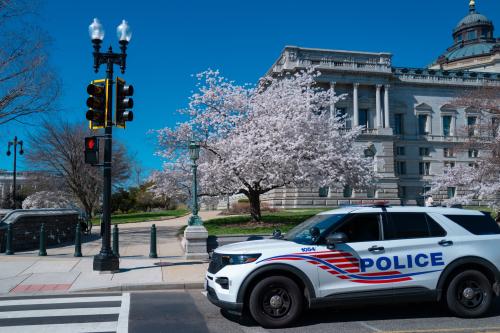

1:30 pm EST - 3:00 pm EST
Past Event
1:30 pm - 3:00 pm EST
1775 Massachusetts Avenue NW
Washington, DC
20036
On December 11, the Brown Center on Education Policy at Brookings released an expanded version of its Education Choice and Competition Index (ECCI), an interactive web application that ranks over 100 of the largest school districts in America on school choice and competition. At the event, Brookings Senior Fellow and Brown Center Director Russ Whitehurst announced that the Recovery School District in New Orleans ranked number one in the Index, and that Orleans Parish ranked number six—signaling the region’s success in expanding school choice. Whitehurst welcomed Governor Bobby Jindal of Louisiana, who delivered a keynote address on education reform in his state and the nation in the context of school choice and competition.
Jindal began his remarks with two assertions: that despite the original goal of public education, America is failing to provide equal opportunity in education; and that teachers unions are responsible for blocking critical progress in education by opposing school choice.
“Teachers’ unions exist for their own benefit, not the benefit of teachers,” said Jindal. “It’s time to bring American education out of the stone age and into the 21st century, a place where our choices are dramatically expanding, and a place where the old centralized government model is increasingly outdated and inefficient.”
Jindal described the process of education reform in Louisiana, beginning with the creation of the Recovery School District and the New Orleans Scholarship Program, which dramatically increased the availability of school choice in the city. In New Orleans, Jindal said, “no child is stuck in the school that happens to be in their zip code, no child is priced out of a better private option, and student achievement is on the rise.”
Jindal then detailed subsequent statewide education reforms in Louisiana to increase school choice, including removing caps on charter schools, creating new pathways to become a charter school, allowing quality, nontraditional providers to offer advanced, technical and virtual educational opportunities, and translating school performance into letter grades available to parents and students.
Jindal argued that providing every child with access to a great education can be achieved in three ways: paying only for high-quality education, whether in a public, charter, virtual school or beyond; opening the market to innovation; and implementing structural changes that increase choice and empower parents, not simply reforming traditional models and systems.
Jindal concluded his address by stressing that education should not be a partisan or ideological issue, but one that can promote consensus. “Equal opportunity in education should not be a conservative position, or a liberal position, it’s an American position,” said Jindal.
Following his address, Jindal and Whitehurst engaged in a conversation about ongoing national reform efforts. Whitehurst described a renewed focus on education reform that returns control to states and local school districts. Whitehurst explained that parents want school choice, but low-income parents are often left without options to choose higher-quality education for their children. He described how competition among schools improves performance, and stressed that the critical innovations needed in education only happen when schools and teachers are free of central governing bodies to innovate.
“Let’s free parents to shop for schools, and create an environment of innovation and reform in American education,” said Whitehurst.
This event was also webcast and live tweeted using hashtag #Choiceindex.

Sweta Shah, Lucy Bassett
April 24, 2025

Zachary Billot, Emily Markovich Morris
April 23, 2025

Hanna Love, Hannah Stephens
April 23, 2025